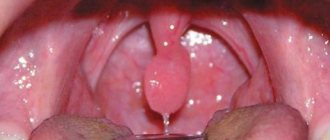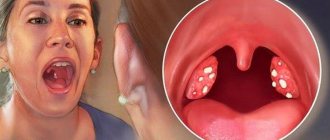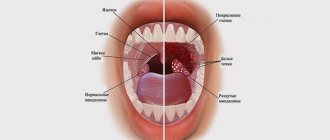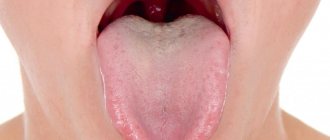Pain in the throat can occur at any time. They are usually a consequence of colds in the nasopharynx, but can also be independent. And since there are many nerve endings in the throat, pain can occur even with the most minor irritations. This symptom is often an indication of the onset of the inflammatory process. If discomfort occurs, you should immediately consult a therapist to identify the causes and begin treatment of the disease at an early stage.
Main reasons
A sore throat may be:
- aching, dull;
- pressing or stabbing;
- bilateral or unilateral;
- constant, increasing and decreasing.
Each of these types of pain indicates a possible cause of the disease.
For example, if discomfort is felt constantly, the pain does not intensify during the process of swallowing, this indicates the likelihood of a disease of another nearby organ, for example, the thyroid gland. Such symptoms may indicate an increase in the size of the thyroid gland (with cancer, hyperthyroidism, etc.).
A common cause of discomfort in the throat area is mechanical or chemical damage to tissue. In the first case, the pain is usually one-sided, in the second, it is most often bilateral. Discomfort when swallowing and soreness can also be a consequence of an allergic reaction.
The most common cause of sore throat is the formation of a focus of infection. Most often, such symptoms occur with the following diseases:
- Tonsillitis (or tonsillitis) is infection of the tonsils by viruses, fungal, and bacterial microorganisms. This disease is characterized by increased pain in the throat when swallowing, headache and redness of the tonsils. The pain may be bilateral or felt on one side.
- Laryngitis (inflammation of the mucous membrane of the larynx) is a disease that can be caused by a variety of factors. Typically, laryngitis is a concomitant syndrome with acute respiratory viral infections; sometimes it occurs as a result of infection by bacteria, most often streptococci and staphylococci. It can also be a consequence of chemical (alcohol, tobacco smoke, concentrated solution of acids/alkalies, food spices) and thermal (as a result of ingesting excessively hot food, drinks) effects. Often found in teachers, lecturers, singers and representatives of other professions associated with the need to overstrain the vocal cords for a long time. Characteristic symptoms of laryngitis: dryness in the larynx, soreness, pain when swallowing, dry cough, hoarseness.
- Pharyngitis is an acute or chronic inflammation of the pharyngeal mucosa. Depending on the etiological factor, viral, bacterial, fungal, allergic, traumatic acute pharyngitis, and also caused by exposure to irritating factors are distinguished. With acute pharyngitis, a sore and sore throat, a dry and sometimes painful cough, is a concern. The temperature may rise to subfebrile levels, rarely higher. If acute pharyngitis is detected against the background of another disease (for example, ARVI), manifestations of the underlying disease (measles, scarlet fever, influenza and others) are added to the clinical signs of pharyngitis. Chronic pharyngitis is not characterized by an increase in temperature and a significant deterioration in general condition. Patients are concerned about the sensation of tickling, tickling, rawness, awkwardness in the throat when swallowing, the sensation of a foreign body that does not interfere with food intake, but forces frequent swallowing movements
- Adenoiditis. This disease - inflammation of enlarged nasopharyngeal tonsils - is most often observed in children under ten years of age. Accompanied by the release of purulent mucous secretion, difficulty breathing through the nose, congestion, and pain in the ears.
- Flu. With this disease, symptoms of general intoxication of the body are observed. In addition to painful sensations in the nasopharynx, the flu is accompanied by moderate or severe pain in all parts of the body, high fever (up to 39 degrees and above). Headaches, chills, general weakness, and intense sweating are often observed.
- ARVI. Acute respiratory viral infections are characterized by photophobia, increased lacrimation, runny nose, and cough. Muscle pain is not expressed, as are headaches, the temperature rises to 37.5-38.5 degrees.
It is not recommended to treat all these diseases on your own. If you experience a sore throat, you should definitely consult a doctor. To alleviate your condition before receiving medical advice, you can use the tips below.
There is a lump in the throat: reasons
Many people feel a lump in their throat after eating, the reasons for this may lie in:
- formation of an abscess in the pharynx,
- formation of neoplasms,
- pathologies of the thyroid gland,
- dysfunction of the cervical spine.
If you feel a lump in your throat with nausea, the reasons for this most often lie in diseases of the gastrointestinal tract.
Signs such as pain when swallowing, a feeling that a foreign object is stuck, suffocating and causing other types of discomfort are observed:
- with gastritis;
- with reflux esophagitis;
- when a hernia forms in the esophagus.
In addition to the fact that there is a lump in the throat, patients are often annoyed by:
- pain in the chest in the center or right, particularly in the esophagus, with difficulty swallowing and breathing;
- belching after eating;
- severe heartburn;
- heaviness in the stomach;
- nausea;
- feeling that there is air in the stomach;
- an unpleasant sour taste in the mouth and a sore throat provoked by it.
Sign up for the First Family Clinic of St. Petersburg to find out how to get rid of a lump in your throat. We offer you a full range of diagnostic measures and consultations with high-level gastroenterologists, thanks to which we can accurately determine the reasons why there is a lump in the throat. We are waiting for you at the multidisciplinary clinics of the Primorsky and Petrograd districts.
How to relieve a sore throat on your own
- Avoid smoking and drinking strong alcoholic drinks.
- Avoid hot or too cold food. Preference should be given to moderately warm, non-spicy food with a soft consistency.
- Ventilate and humidify the air in the room more often.
- Talk less so as not to overstrain your vocal cords.
- Drink plenty of fluids - warm water with honey, lemon, herbal teas.
- Dissolve lozenges and throat tablets.
- Gargle with soda solution (1 tsp per glass).
A popular folk remedy for fighting inflammation of the throat and upper respiratory tract is inhalation using boiled potatoes in their jackets or hot infusions of medicinal herbs, currant leaves, mint, lemon balm, raspberries.
Aqualor Throat - an effective remedy for sore throat
Sea water is considered one of the best natural ways to combat sore throat. But liquid taken from the coastal zone can be harmful due to the content of large amounts of toxic organic and chemical impurities, as well as pathogenic microorganisms. A solution of sea salt for rinsing, or rather a solution of sea water, Aqualor Throat, is made from clean water collected at a depth of several tens of meters. After collection, the water undergoes additional filtration and sterilization. It also contains extracts of aloe vera and Roman chamomile, which have anti-inflammatory, antiseptic and restorative properties.
The result is a drug that is used for sore throats in adults and children. It has been confirmed that using Aqualor Throat can positively influence the healing process*.
*for pharyngolaryngitis M.R. Bogomilsky, E.Yu. Radzig “Bulletin of Otorhinolaryngology”, No. 2, 2010.
Why can teeth hurt?
Toothache can have a variety of causes, including hot and cold foods or drinks. Another - although not the most common - factor that can cause tooth pain is a cold or sinus infection. Increased pressure in the sinuses can cause discomfort in the area of the teeth, since the roots of the latter are located close to the sinuses. One way or another, it is important to find out whether this discomfort has more serious causes that require medical intervention.
How to find out why your teeth hurt?
If you have symptoms of a cold, flu or sinus infection, such as nasal congestion and sinus pressure, then it is likely that your toothache is related to this condition. The frontal sinuses are located close enough to the roots of the teeth and their nerves that pressure and pain in the sinuses can be transmitted to the structures of the oral cavity. As otolaryngologists explain, pain in the teeth of the upper jaw is a common symptom of sinusitis. Talk to your doctor about treatment for sinusitis or other respiratory illness that may cause nasal congestion. On the Medportal information website you will find a detailed description of many respiratory diseases and their symptoms, including a runny nose, sore throat and frequent dry cough.
Often with colds and flu, there is stuffiness in the ears, obstruction of the Eustachian tubes, and otitis media develops. Pressure in the ear can cause discomfort in the chewing teeth and roof of the mouth. If your ear and teeth on the same side of your head hurt at the same time, the cause of the toothache may be irradiation of pain from the ear, explain experts from the St. Petersburg State Medical University named after Academician I. P. Pavlov. In the absence of an ear infection, ear congestion is treated in the same way as sinus or nasal congestion. If your ears hurt and feel as if they are full of fluid, you feel pressure on your eardrums and hear frequent clicking sounds, consult a doctor to rule out inflammation of the middle ear, which may require antibiotics to treat.
If your teeth hurt, but there are no symptoms of a common cold, and you do not know what the cause of the pain is, then the best thing to do is to visit a dentist for an accurate diagnosis. Some conditions that provoke toothache are fraught with serious consequences and require immediate medical intervention. Direct or indirect causes of toothache can, of course, be dental diseases and conditions such as periodontitis, caries, enamel erosion, loss of hard dental tissues and involuntary grinding of teeth during sleep (bruxism).
How to relieve toothache caused by a cold
If your toothache is caused by nasal congestion caused by a cold, flu, or sinusitis, try reducing the pressure in your sinuses. To do this, you can use over-the-counter vasoconstrictors and mucus thinners. Rinsing the mouth with a decoction or tincture of sage, chamomile and other medicinal herbs can also relieve toothache. You can also resort to over-the-counter pain relievers. In addition, the following can help reduce toothache:
- rest and long sleep
- warm drinks and soups
- cold medicines that thin the mucus that causes nasal congestion
- cough drops or tea with honey to relieve throat irritation caused by sinus discharge
As additional means for use at home, specialists from the Scientific Research Clinical Institute of Otorhinolaryngology named after L. I. Sverzhevsky recommend using a humidifier and rinsing the nose. If you experience pain in your sinuses or a feeling of strong pressure in them when you tilt your head in different directions, you should definitely consult a doctor, especially if the pain does not go away for a long time and/or is accompanied by an increase in temperature - this may be a sign of a serious sinus infection, or sinusitis.
Teeth can also hurt due to increased sensitivity. If pressure and contact with cold or hot foods and drinks cause acute, short-term pain in your teeth, a special toothpaste for sensitive teeth can help. If your toothache is not related to a cold or sinus infection, be sure to consult with your dentist, who can make the correct diagnosis and recommend appropriate treatment.











